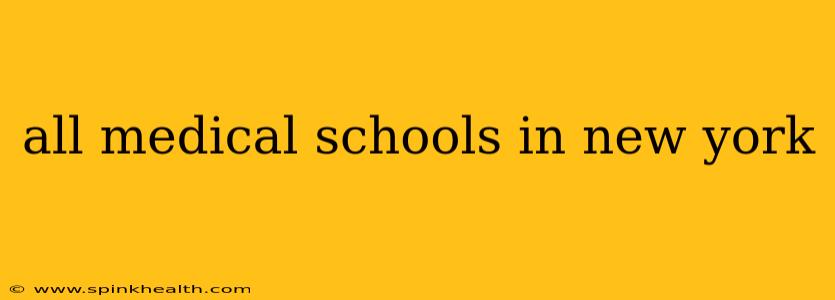New York State boasts a rich history of medical education, home to some of the most prestigious and innovative medical schools in the world. Choosing the right medical school is a monumental decision, and understanding the landscape of options is crucial. This guide delves into all the medical schools in New York, providing you with a comprehensive overview to aid in your research.
Let's embark on this journey through the world of New York medical education. The story begins not with a single school, but with a tapestry of institutions, each with its unique character and contributions to the field of medicine.
The Big Names & Beyond: A Look at New York's Medical Schools
New York's medical school scene is diverse, ranging from established giants to newer, equally impressive programs. Here's a glimpse into some of the key players:
-
Columbia University Vagelos College of Physicians and Surgeons: A cornerstone of American medicine, Columbia's medical school is renowned for its research prowess and strong ties to NewYork-Presbyterian Hospital. It's a consistently top-ranked institution attracting students and faculty from around the globe. The rigorous curriculum, combined with abundant research opportunities, makes it a highly competitive choice.
-
Cornell University Weill Cornell Medicine: Part of the Ivy League, Weill Cornell Medicine holds a similarly prestigious position. Known for its cutting-edge research, especially in areas like genomics and neuroscience, Weill Cornell offers a highly selective and challenging medical education. Its close affiliation with NewYork-Presbyterian Hospital provides students with unparalleled clinical experience.
-
Icahn School of Medicine at Mount Sinai: Located in the heart of Manhattan, Mount Sinai's medical school shines with its commitment to both patient care and groundbreaking research. Its diverse patient population provides students with a rich clinical learning environment. The school fosters innovation and collaboration, pushing the boundaries of medical knowledge.
-
New York University Grossman School of Medicine: NYU Grossman School of Medicine is another powerhouse in the New York medical landscape. With its location in the vibrant city, students benefit from access to a diverse range of clinical settings and research opportunities. The school's focus on community health and urban medicine sets it apart.
-
University at Buffalo Jacobs School of Medicine and Biomedical Sciences: This state university medical school brings a different perspective, emphasizing a strong community focus and commitment to serving the Western New York region. While still highly competitive, it offers a slightly different learning environment compared to its counterparts in New York City.
-
Albany Medical College: This institution, while geographically outside of New York City, plays a vital role in providing medical training for the upstate region. Its focus is on training physicians to serve the needs of diverse communities.
-
SUNY Downstate Health Sciences University College of Medicine: Another public medical school contributing to the medical workforce of the state, SUNY Downstate is committed to training physicians to serve the underserved populations of Brooklyn.
Frequently Asked Questions About New York Medical Schools
Now that we've covered some of the major players, let's tackle some common questions people have about applying to and attending medical school in New York:
What are the admission requirements for medical schools in New York?
Admission to any medical school in New York is incredibly competitive. Expect rigorous academic requirements (a strong GPA and MCAT score are essential), significant volunteer or shadowing experience in a medical setting, compelling personal essays highlighting your motivations, and strong letters of recommendation.
How much does it cost to attend medical school in New York?
Tuition at New York medical schools varies significantly, depending on the institution (public vs. private) and the individual program. It's essential to research the cost of attendance for each specific school you're considering and factor in living expenses in New York City, which can be high.
What are the job prospects after graduating from a New York medical school?
Graduates of New York medical schools are highly sought after, boasting excellent job prospects. The state’s vast network of hospitals and healthcare facilities, combined with a high demand for physicians, creates a robust job market for medical school graduates.
Are there any specific specializations offered at New York medical schools?
New York medical schools offer a vast array of specializations, reflecting the diversity and sophistication of the state's healthcare system. You'll find programs in nearly every medical specialty imaginable, from cardiology and oncology to pediatrics and neurosurgery, with many schools excelling in specific areas of research and clinical practice. Be sure to check each school's website for their specific program offerings.
What is the difference between public and private medical schools in New York?
The distinction between public and private medical schools lies primarily in funding and tuition. Public schools, like those within the SUNY system, are funded by the state, generally resulting in lower tuition costs for in-state residents. Private schools rely on endowments, donations, and tuition revenue, leading to higher tuition costs but potentially greater resources and research opportunities. Both offer excellent education, but the financial implications are quite different.
This journey through New York's medical schools has only scratched the surface. Each institution holds a unique story, brimming with opportunities and challenges. The best school for you will depend on your individual aspirations, goals, and preferences. Thorough research is key to making an informed decision for this crucial step in your career. Remember to explore each school’s website directly for the most up-to-date and accurate information.

